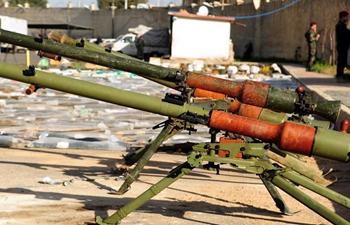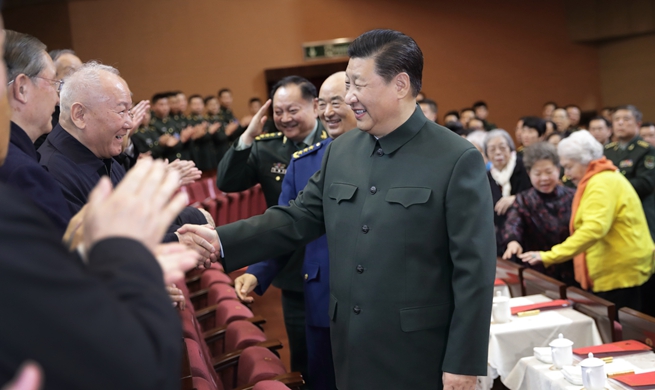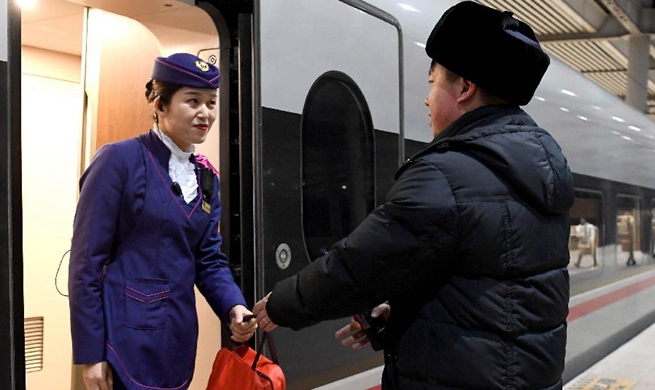ANKARA, Jan. 24 (Xinhua) -- Russia urges Ankara for dialogue and cooperation with Damascus against extremist groups in Syria, experts said.
Moscow promoted rebuilding dialogue between Turkey and the Syrian regime to serve their common interests regarding "fight against terror," Kerim Has, an academician on Russia-Turkey relations, said, referring to a meeting between Erdogan and Putin that took place in Moscow on Wednesday.
The issues of Idlib, the last stronghold of rebels in Syria, and establishing a constitutional committee for new Syrian charter, were priorities of Russian side during these talks, he said.
Russia and Turkey agreed on a demilitarized zone between the armed opposition and the government troops in Syria's Idlib province by Oct. 15, but the obligations of the deal are not met yet.
Has noted that Hayat Tahrir al-Sham (HTS), the umbrella group of the al-Qaida-linked Nusra Front, advanced its territory in Idlib.
The deal proposed mobile patrol groups consisting of Turkish army units and Russian military police units to control the situation in the demilitarized zone, but such patrolling could not be realized yet.
Turkey objects a possible offensive in Idlib, citing that it could cause great civilian casualties and even a humanitarian disaster.
The Turkish leader's main agenda was a U.S.-proposed 32-km safe zone inside Syria, which Turkey embraces in order to protect Turkish borders from the Kurdish People's Protection Units (YPG), seen by Ankara as an offshoot of the outlawed Kurdistan Workers' Party (PKK), according to the expert.
In reply to a question on how Russia sees the proposed security zone at the joint press conference, Putin said: "The treaty between Syria and Turkey of the year 1998 is still valid. And it deals, in particular, with the fight against terrorism. I think this is the base that closes very many issues in terms of ensuring Turkey's security on its southern borders."
Referring to Adana accord, a bilateral anti-terror protocol sealed in 1998, Putin suggested that "Ankara and Damascus can open dialogue over this security agreement and make cooperation against terror groups," he said.
Elaborating on ways of suggested cooperation, Has pointed at the Syrian regime's struggle against al-Qaida-linked groups in Idlib and Turkey's security concerns against the YPG presence in northern Syria.
Recalling that Russia opposed the idea of safe zone in northern Syria, Has said, "We see that Turkey and Russia could not reach consensus for establishing a safe zone in northern Syria."
Russia promotes collaboration between Ankara and Damascus before U.S. realizes its pullout from Syria, and also promotes talks between Kurds and the Syrian regime to avoid a U.S.-proposed safe zone, the expert said.
He reminded that Moscow is worried that the safe zone could bring stronger autonomy to Syrian Kurds at the end of the day, as it happened in northern Iraq after the war in this country.
Another expert also stressed that Russia tries to establish dialogue between Ankara and Damascus to "legitimize" Syrian regime.
"Moscow expects Turkey accepts legitimacy of the Syrian regime," security expert Abdullah Agar said. He underlined that Russia, Turkey and Syrian regime are all promoting Syria's territorial integrity and Moscow aims to seal this integrity through cooperation of three countries.
Meanwhile, Turkey welcomed Putin's referral to Adana agreement with regards to maintaining its security along Turkish border against the YPG.
"We think he referred to this (protocol), meaning that Turkey can intervene into (Syria). And this is a positive thing for us," Foreign Minister Mevlut Cavusoglu said speaking in a televised interview on Friday.
The minister said Turkey was in indirect contact with the Syrian government.
Turkey and Russia are "on the same page" regarding a political solution in Syria besides the issue of whether President Bashar al-Assad should stay in office, he said.
Turkish officials reportedly confirmed low-level contacts between Turkish and Syrian intelligence officials for operations in Syria.
The Adana Protocol was signed in 1998 after Turkey threatened to intervene militarily if the Syrian government does end its support to the PKK and its sheltering for the PKK leader Abdullah Ocalan on its territories.

















